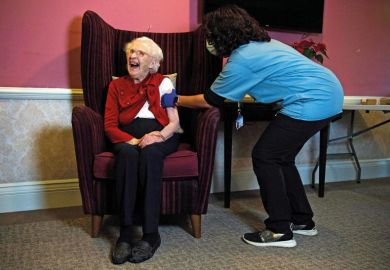As an experiment, I just asked my other half what he thinks the Research Excellence Framework (REF) is. Bear in mind that my other half is not an academic and only half-listens to half the things I say. Still, he had some idea how to respond.
As expected, he correctly suggested that the REF identifies which UK universities are producing the best research. What he didn’t mention, though, was the relatively new aspect of the REF that has already driven a fundamental culture change in how researchers work. So only half a brownie point for him.
I’m talking about impact, of course. There was an increased emphasis on impact for REF 2021, and its definition was formally broadened to include public engagement.
Demonstrating how public investment in research is benefiting the very same public who are doing the investing is a good thing. After all, most researchers do what they do precisely because they want to make the world a better place. With that said, I now feel a bit daft admitting that for the first decade of my career in neuroscience, it had not occurred to me that it was my responsibility to make sure that my research translated into actual real-world benefits.
Even more embarrassingly, it took longer still for me to recognise that this real-world benefit that I cared so much about but spent no time trying to meaningfully capture was much easier to generate simply by involving the people I was studying in my research into Parkinson’s disease.
We now call this “Public Involvement and Engagement”, or PIE, which essentially means asking the people you’re studying for their input and, ideally, formally collaborating with them to make sure that their input is embedded in the project. This seems blindingly obvious now, but when I got my PhD in Ye Olden Times (2005), it had not crossed my mind that my participants understood their condition far better than I did.
I recognise that this makes me seem disconnected from the people with Parkinson’s whom I claimed to be working for. But this isn’t quite how it was. Any researcher will confirm that collecting high-quality data from human participants takes skill. My advice is to aim to make your participants feel more like they’re visiting their regular, trusted hairdresser than a doctor.
In this atmosphere, during my time as a postdoc at the University of Toronto, I struck up a friendship with one of my participants. His name was William, and he remains one of the funniest people I have ever known. He once convinced me that he’d been on the verge of a religious epiphany after promising God his devotion if He’d only make a parking space available so he could get to his neurology appointment on time. In the story, a parking space appeared, at which point William looked to the heavens and said [pause for effect], “Don’t worry, found one.”
I’d had my first baby a year previously, and William loved being around her. Like many people with Parkinson’s, he had balance problems, so we’d go swimming together in the pool in his condo. The water meant that he could balance himself enough to hold my daughter. He’d pretend to drop her till she cried with laughter, all the while teasing me by pretending that he really was going to drop her. He was a hoot.
I’m ashamed to say that it didn’t occur to me to ask William what he thought about my research. My purely academic-driven view of the research process meant that I failed to involve him at any point – despite my particular interest in balance problems. Deservedly, my applications for research funding back in the UK were also falling flat.
I recognised the opportunity that I had lost only after the Stern review of the 2014 REF (when impact was introduced), which led to guidance about how to how to meaningfully involve the public in research for REF 2021. I now work closely with charities such as Parkinson’s UK, which is helping to forge closer links between people with Parkinson’s and researchers across the north-west.
Manchester Metropolitan University, where I now work, values the fundamental importance of PIE, and it is surely no coincidence that REF 2021 saw us rocket up the league tables. Unlike my other half, we’re fully listening to the things our partners in the communities we work with have to say.
That’s not to say that doing PIE well is always easy. Communicating the complexities of neuroscience to non-specialists can be challenging, and this can be perceived as a barrier to meaningful involvement. However, PIE comes in many forms, and there is always more to a research question than the specifics of the underpinning science.
In collaboration with people with Parkinson’s, we recently held an event to engage people with the results of my lab’s Wellcome Trust-funded project on the neuroscientific basis of balance problems. There was no swimming, but we did play brain bingo and had a good dance.
William would’ve loved it.
Nicola Ray is a reader in the Faculty of Health, Psychology and Social Care at Manchester Metropolitan University.
Register to continue
Why register?
- Registration is free and only takes a moment
- Once registered, you can read 3 articles a month
- Sign up for our newsletter
Subscribe
Or subscribe for unlimited access to:
- Unlimited access to news, views, insights & reviews
- Digital editions
- Digital access to THE’s university and college rankings analysis
Already registered or a current subscriber?








